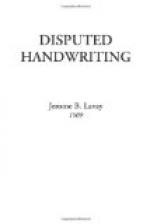Where a witness is called to testify to handwriting, from knowledge of his own, however derived, as to the hand of the party, he is not an expert, but simply a witness to a fact in the only manner in which that fact is capable of proof. Nor is he an expert who is called to compare a test writing, whose genuineness is established by others, with the writing under investigation, if he have knowledge of the handwriting of the party, because his judgment of the comparison will be influenced more or less by his knowledge, and will not be what the testimony of an expert should be, a pure conclusion of skill.
But when a witness, skilled in general chirography, but possessing no knowledge of the handwriting under investigation, is called to compare that writing with other genuine writings that have been brought into juxtaposition with it, he is strictly an expert. His conclusions then rest in no degree on particular knowledge of his own, but are the deductions of a trained and experienced judgment, from premises furnished by the testimony of other witnesses.
One of the palpable anomalies of the present practice regarding experts on handwriting is that a person who has seen another write, no matter how ignorant the observer may be, is competent to testify as to whether or not certain writing is by the hand of the person he has once seen engaged in the art of writing, while an expert handwriting witness may only testify that the hand appears to be simulated but may not point out the differences between specimens of genuine writing and the instrument in controversy.
It is safe to presume that the apparently unreasonable position of the law was assumed with a good object in view, and it is probable that the object was the protection of the court from the swarm of so-called experts which might be hatched by a laxity in the wording of the law. Few things would be easier for a dishonest person than to swear he was a competent expert, and then to swear that a document was, in his opinion, forged or genuine, according to the requirements of his hirer. The framers of the practice in reference to expert testimony on documents seem to have had in mind that the only possible kind of testimony as to documents was that based upon impressions; and that the only method of coming to a conclusion was by giving words to the first mental effect produced on a witness after he has looked at a writing.
For this reason the practice has grown up in many trials of preparing carefully forged signatures and producing them before the witness as a test of how far he is able to distinguish genuine from forged signatures.
However expert a witness may be, however successful in discriminations of this kind, self-respect and a becoming modesty should induce him to refuse to answer them without distinctly stating that his answer, which gives his best judgment at the time, must be subject to reversal if by longer and more thorough investigation it appear that the opposite view were the true one.




